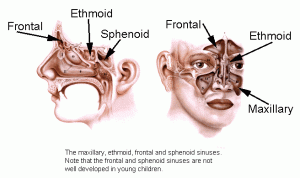Sinusitis (Sinus Infection)
 Sinusitis is a common problem. Sometimes sinusitis needs referral to a specialist for further investigation. Some people develop a chronic sinusitis of some of their sinuses following a bad cold. Others develop very frequent episodes of sinusitis. In some cases these sinusitis infections can be quite resistant to antibiotic treatment and additional measures may be necessary.
Sinusitis is a common problem. Sometimes sinusitis needs referral to a specialist for further investigation. Some people develop a chronic sinusitis of some of their sinuses following a bad cold. Others develop very frequent episodes of sinusitis. In some cases these sinusitis infections can be quite resistant to antibiotic treatment and additional measures may be necessary.
What are the sinuses?
The sinuses are air-filled spaces within the face that communicate with the nasal airway. They have different names according to their location – maxillary, sphenoid, ethmoid and frontal. Sometimes only one sinus in diseased, other times they can all be involved.
What are the symptoms of sinusitis?
Sinusitis can cause pain of the face or head (a sinus headache), toothache, a blocked nose or stuffy nose, drip down the back of the nose (post-nasal drip), a runny nose, loss of smell, snoring, sleep apnoea or just a general feeling of being tired and unwell. In some patients sinusitis causes a chronic cough from mucus dripping down into their throat. Rarely severe sinusitis can spread beyond the nose can cause double vision or even meningitis.
What should I do if I think I have sinusitis?
The first step is to talk to your GP about your symptoms and try a course of oral antibiotics in combination with a steroid nasal spray and some salt water irrigations. There are a number of different choices for all three of those treatments but in many cases it is important that all three are used at the same time and for at least 2 to 3 weeks. If your symptoms of sinusitis persist after this you should consider seeing an Ear, Nose and Throat specialist.
What will an Ear, Nose and Throat specialist do to investigate and treat sinusitis?
An Ear, Nose and Throat specialist will first take a detailed history to identify your main symptoms and to begin to determine the cause of your sinusitis. Any previous treatment for sinusitis that has been tried will be noted, so have a think about what has been useful and what has not.
The next step in investigating sinusitis will be to examine your nose and sinuses. This will include a procedure called a nasendoscopy. Anatomical problems such as deviated nasal septum as well as a number of disease processes including nasal polyps can be identified.
Appropriate investigations for sinusitis will then be discussed. These may include allergy testing, autoimmune disease testing and other blood tests for rare illnesses. A CT scan of the nose and sinuses is then usually necessary.
What are the treatment options for sinusitis?
 Sinusitis can be addressed with medications, surgery or a combination of both. Surgery is not always necessary for sinusitis and many sinus problems can be treated with medications alone.
Sinusitis can be addressed with medications, surgery or a combination of both. Surgery is not always necessary for sinusitis and many sinus problems can be treated with medications alone.
Sinus surgery for sinusitis has become highly skilled and sub-specialised in recent years with some ear, nose and throat specialists being trained in the latest minimally invasive endoscopic sinus surgery (keyhole) techniques.
Dr Roth is an Ear, Nose and Throat surgeon with subspeciality training in the nose and sinuses. He is well versed in the most up to date manage of sinusitis.


